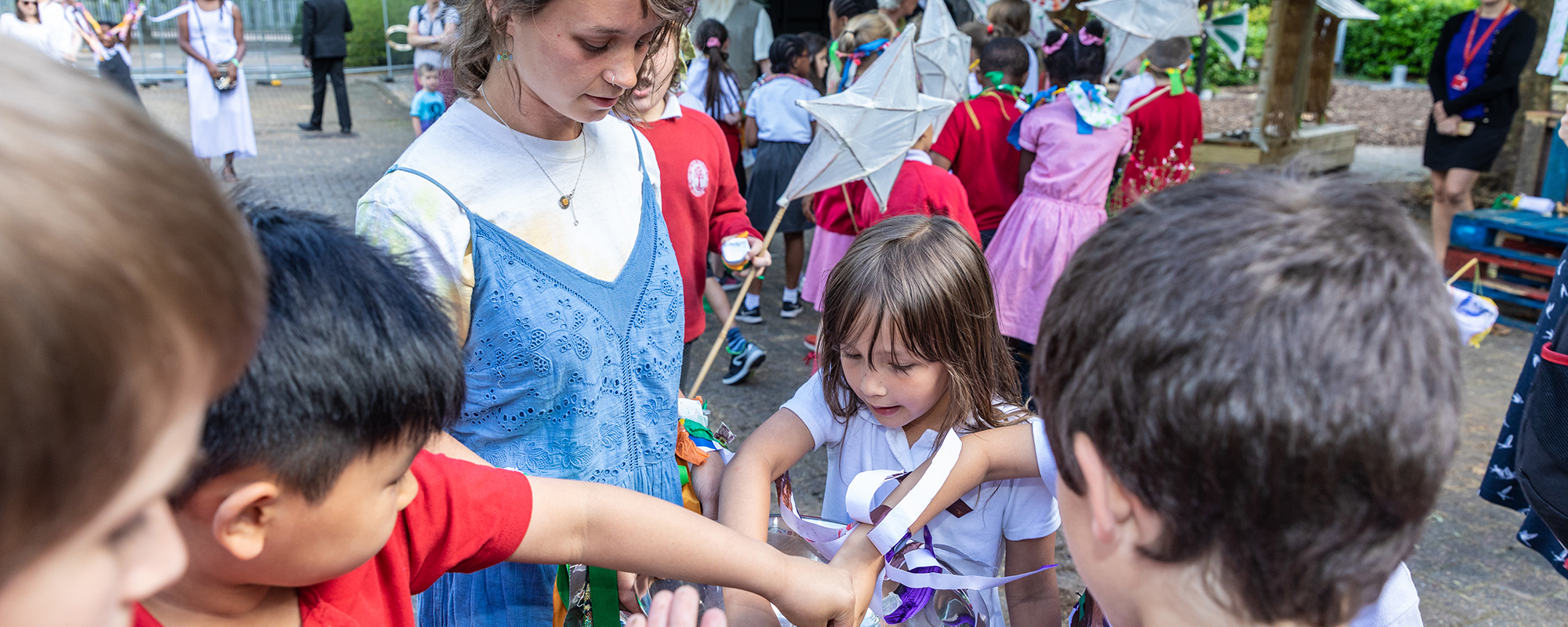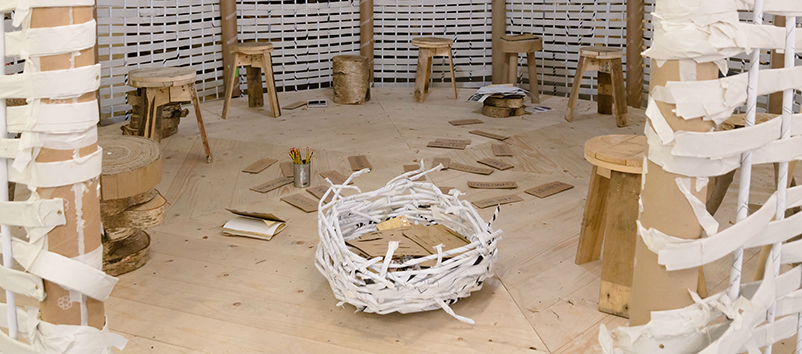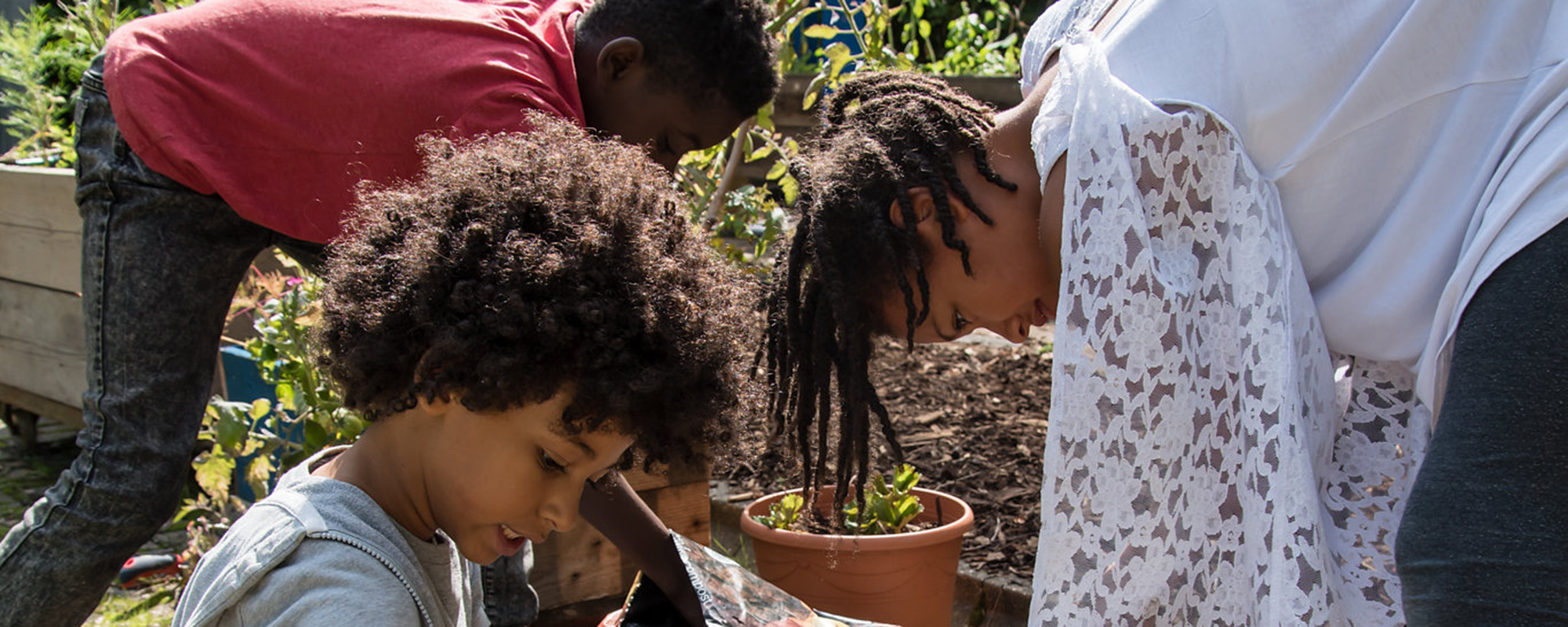Get updates from The Developer straight to your inbox Yes, please!
How an old printworks in Canada Water can embody ‘I, we and the planet’
Jane Riddiford, co-founder of Global Generation, tells us about Paper Garden, its new incarnation at Canada Water, and how the project can help realise the power of community
Global Generation’s much-loved Skip Garden is an organic core for the King’s Cross development. Co-founder Jane Riddiford tells us about The Paper Garden, the new incarnation at Canada Water, and how the project can help us realise the power of community.
Riddiford previously co-ordinated Camden’s Environmental Education Network, ran an NVQ horticulture programme, developed an inner-city forest in Auckland and, with Rise Phoenix, has worked with children in war-torn areas. She says her primary aim in these central developments “is to give children, young people and adults experiences of that wild spirit of nature”.
She tells us how she was pleased to hear the head of Canada Water development and former chief executive of Argent, Roger Madelin, describe Global Generation as “helping making the buildings more porous, enabling the community to come in”.
Based in what was the Daily Mail Printworks on the edge of the Canada Water masterplan, work on the Paper Garden began three years ago when Riddiford was asked by Madelin, who was responsible for the 67-acre King’s Cross development, to come south with her garden makers and community builders to create something informed by the experience of the Skip Garden and their ‘I, we and the planet’ mindset.
“Our work, especially in cities, is to penetrate the concrete, whether that’s in places or in people. And to bring out the life beneath the concrete, whether that’s in the soil or in hearts and minds.”
Riddiford chose to work for Madelin and his colleagues because of their “respect”. “We’re being taken very seriously. I say we’ve been taken into the subsoil,” she tells us.
The Paper Garden does not work entirely for the developer British Land and Roger Madelin. “We’ve always wanted to be no more than 50% funded from the developer. That enables us to be a critical friend and not entirely dependent,” says Riddiford.
With some money from the typical community pot, the project is funded in the form of a monthly retainer and often community organisations are paid for their delivery of specific projects. Riddiford believes that this tells a story in itself, because it means that the Paper Garden can do work that it feels is important. This funding arrangement enables Global Generation to have the necessary conversations, and be part of the background work, Riddiford tells us.
“Our work, especially in cities, is to penetrate the concrete and bring out the life beneath the concrete”
As a local to King’s Cross, Riddiford was conscious of being an outsider at Canada Water, “parachuting in with our own ideas”.
Despite being tentative, Riddiford says that Madelin gave her and her colleagues time and space to meet local people. Riddiford calls her approach “being on the outside of the inside”. Paper Garden now has a growing network of secondary school and primary school students getting involved. It is not difficult to believe, with their inclusive philosophy, that Global Generation is having a universal appeal.
Global Generation operates in three different areas: Canada Water, King’s Cross and Euston. “Each place works like a local ecosystem,” says Riddiford.
The Paper Garden is craft based, with design and arts activities working with more primary school children, while at King’s Cross there is a secondary school orientation. Regent’s Place works differently again. The already established development at Regent’s Place saw Riddiford employing a more nomadic way of working. “We have a big tent that we set up at the bottom of office buildings and that’s a kind of nest to fly out from.”
There was initial dismay at Canada Water when Riddiford was shown the “dank and musty” old Printworks tool store with no windows and only a metal shutter, and asked: “Will this be a good home for the community?”
It wasn’t an ideal space to work with children or gardens. “My heart sank,” she says.
Recording The Developer Podcast sitting in a woven paper yurt, surrounded by delicate dangling features of a paper garden forest, was a demonstration of the work of children and young people to transform the old Printworks into Paper Garden. “The Paper Garden workshop has come to life. You could say the spirit of the forest has entered a place that had seen little or nothing of that,” says Riddiford, gesturing at the space where people come for designing, making, growing, cooking, storytelling and creative writing.
“Our interest is in connecting people to the natural world. You might talk about the spirit of the forest, and it was obvious that the spirit of the forest had never made its way into the Daily Mail Printworks.”
Creating stories with and for the community is a thread through the Global Generation projects. Riddiford speaks of a revival and growing recognition in the role of artists and storytellers as a part of enterprise and business. “Sometimes I think I’m a split person. Half my brain is a spreadsheet and the other half is storylines.”
“There are so many [community] divisions. It’s what comes out in the space between the ‘us’ and ‘them’, the in-between space”
Riddiford pursues stories and narratives to bring places to life. “At the Paper Garden there is a labyrinth of stories using myth and cultural history.” This mythos is for Riddiford an alternative to the otherwise sterile development process.
“We’ve met older people and one of them had collected blackberries from here as a child to make jam, so part of our garden area here is dedicated to the different kinds of plants you make jam out of.”
The Paper Garden is a space that intends to honour the history of the area and has expanded into a real garden next to the Printworks car park. Here, activities similar to Skip Garden take place: planting, growing and also clay making. Just as children and young people have come to the space, they will in the years to come have the opportunity to work with the wider development, like the landscape architects, in creating pockets of gardens in the public spaces.
One of the young ‘generators’, Catherine (who was part of the flagship programme for 14 to 18-year-olds), told us how young people had the opportunity to raise their concerns with the Canada Water architects. “A lot of them were asking us things like, ‘Where are we going to put our kids when it’s our time?’ It’s so crazy to think 15-year-olds were asking questions like this, it’s really refreshing. Hopefully the architects considered what we have to say.”
Catherine got involved with the Paper Garden two-and-a-half years ago and did an intern placement in the summer after learning about Paper Garden through boys at her sixth form.
“There was an opportunity to get involved and learn more about the planet and things you see day-to-day but don’t actually get to learn in school.” She says the Paper Garden offers “a different perspective to be more conscious about your surroundings”.
The Canada Water development has a number of charities and initiatives in its masterplan, including a Young Farmers’ Club and the National Literacy Trust. Catherine says she valued
working with Time & Talents, which runs targeted projects for people with high levels of need. She has also met people from Southwark Council and had the opportunity to talk about their plans for Canada Water. “I felt part of my history in Bermondsey was going to go away with the new plan, but I think it was nice to hear that from their perspective it was more a continuation and a rebuilding of that culture,” she says.
“The Paper Garden workshop has come to life,” says Riddiford, gesturing at the yurt where people come to design, make, grow, cook, storytell and write
When Global Generation first went to Regent’s Place, Riddiford says “it felt like we were in the jaws of the corporate dragon”. With children, young people and the natural world as the focus, Riddiford is engaging the corporate figures who are leading the development and building relationships with the service teams on the ground, having conversations that “travel through the hierarchy”.
Global Generation seeks to work in an integrated way with developers. Riddiford describes interacting with those at the top of the food chain at British Land. “They were willing to enter into a dialogue and know that this is not a formula.” At Canada Water, Riddiford says the masterplanners, architects, landscape architects and herself went down to the Eden Project, which she found indicative and encouraging.
The danger for community engagement projects and anything that serves the public good is that it can become a box-ticking exercise, but Global Generation does not work if that is the case. “If the work is just about engaging x number of young people, or just the community delivery, then I don’t think it would really have any power to change hearts and minds.” However if Riddiford’s work is indeed being used for a good story, she thinks only time will tell.
In the meantime, there are measures developers can take and be more open to the wider community. Riddiford wants to have a mutual working relationship with developers. “There is something about cultivating empathy and the ability to hold multiple perspectives and stand in each other’s shoes. And arguably that’s what we need to do as a human species,” she says.
Sometimes seemingly detached figures involved with the Canada Water development are invited to come to the Paper Garden and make art and garden with primary school children. “I have seen sudden sparks in the imagination of the landscape architects.” When these people come to the Paper Garden, Riddiford notes how it “gives permission and brings out a different spirit”.
Whenever the Global Generation team are in the Paper Garden they cook and eat together. Riddiford remembers the first day at Paper Garden, setting up the Bunsen burner and cooking our first lunch: “Children and young people and all the different stakeholders one engages with, Broadgate and the service teams, the developers and the architects and the teachers, we as an organisation must have a sense of community between us and eating together helps grow that.”
It is not all plain sailing. Riddiford admits that working with local communities can be challenging. “There are so many divisions. However it’s what comes out in the space between the ‘us’ and the ‘them’, the in-between space, that is really interesting.”
When measuring the success of the projects, Riddiford says the best outcome “is if something comes out that none of us can already imagine”.
At the Paper Garden the rewards are beginning to show. “Going deep rather than going wide has its own effect over time,” says Riddiford.
Global Generation is offering an MSc programme with Middlesex University in transdisciplinary studies with a community-based regeneration focus; the next cohort begins in 2020. Riddiford wants to attract people who are “curious about how other people think, and are interested in a bigger sense of wholeness”.
This goes for all those wanting to operate with ‘I, we and the planet’ in mind. Riddiford’s work does not follow a handbook. “It takes a person who is not afraid of standing in different circumstances. So maybe standing in silence in the forest and also standing in the gritty cut and thrust of business,” she says. This poses a question to traditional placemakers, and perhaps a solution.
Listen to the podcast by clicking on the link and sign up to The Developer Weekly to be updated when new episodes go online.
Sign up to our newsletter
Get updates from The Developer straight to your inbox
Thanks to our organisation members
Become a member
© Festival of Place - Tweak Ltd., 124 City Road, London, EC1V 2NX. Tel: 020 3326 7238



